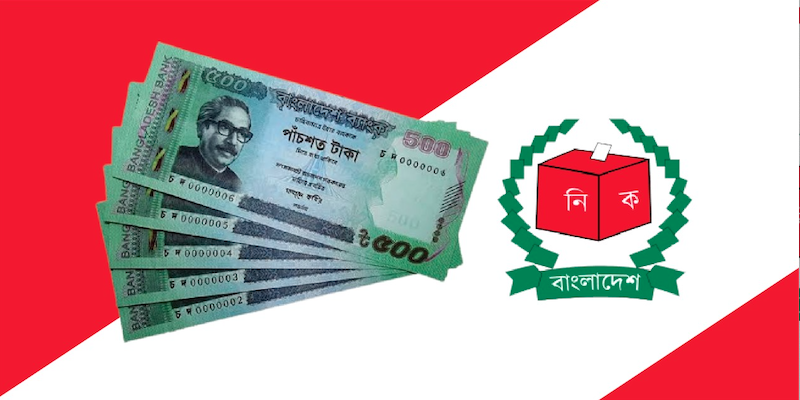Over half of election budget allocated to law and order, raising concerns of opposition suppression
Publish: 05 Jan 2024, 06:24 AM

In the 12th National Assembly elections, 53.9 per cent of the total allocation will be dedicated to maintaining law and order, purportedly aimed at suppressing opposition parties. The estimated election cost is 2,276 crores, with approximately 1,225 crores earmarked for law and order expenses. The Election Commission spends money on 20 sectors for organising elections. The Commission will distribute the remaining budget of Tk 1,050 crores across 19 industries for organising the elections, as detailed in a letter from the Election Commission to the Ministry of Finance.
In the 12th National Assembly elections, expenditure across 20 sectors is anticipated. Among these, proposals suggest doubling or even further increasing the budget for 17 sectors, while one sector calls for spending cuts, and two sectors aim to maintain the existing budget.
The Election Commission's initial calculations have set the cost at Tk 7,22,61,054 per seat to conduct the simultaneous election nationwide. This amounts to an estimated expenditure of 2,276 crores, 22 lakhs, 32 thousand, 139 takas for organising the national parliament elections in 300 seats—a historic high in election expenses for the country. Approximately 1,225 crores and 62 lakh takas have been allocated solely for maintaining law and order during this year's election. The remaining 1,050 crores, 60 lakhs, and 38 thousand 300 takas have been allocated for other election-related activities, marking a record-breaking expenditure.
Nonetheless, reliable sources suggest that these costs may escalate eventually. In such a scenario, any additional expenses will be adjusted in the final revision of the current fiscal year's budget.
The total expenditure for organising the 11th National Assembly elections amounted to 750 crore taka. In comparison, the twelfth election showcases a remarkable increase of 203.47 per cent from the preceding eleventh national election. During the 11th election, 450 crores were allocated to law enforcement forces overseeing the election process, while the remaining 300 crores were designated for the commission's election management work. Notably, the 10th National Parliament election held in 2014 incurred a cost of approximately 300 crore taka, indicating a substantial escalation in election expenses between the 10th and 11th elections.
The review of the Election Commission's budget regarding the elections reveals a staggering sevenfold increase in advertising expenses compared to the previous period.
The initially approved allocation in the main budget for Election Commission election management expenses stood at Tk 48 crore 62 lakh 23 thousands. However, this amount has surged significantly in the revised budget, increasing fourfold to Tk 239 crore 26 lakh 56 thousand. Notably, there's a proposed change in the allocation method for polling station preparation work, shifting from a per-centre basis to a per-room allocation.
In the EC budget, allocations propose expenditures of Tk 217 crore 22 lakhs for petrol, oil, and lubricants, Tk 115 crores 16 lakhs for printing and binding, Tk 318 crores 67 lakhs for stationary goods, Tk 119 crores 68 lakhs for honorarium, and Tk 25 crores eight lakhs for worker wages. Additionally, there is a proposed expenditure of Tk. 10 crores 60 lakhs for venue rent, Tk. 85 crores 12 lahks for transport costs, approximately Tk. 10 crore for machinery and equipment, and Tk. 22 crores 48 lahks for stamps and seals.
For poll officials, financial incentives are being substantially increased, up to a maximum of 7 times. This strategy encourages their participation in election management despite the associated risks.
Various law enforcement forces are slated to receive Tk 1,225 crore 62 lakhs from the Election Commission to cover their expenses during duty, an amount nearly twice the total cost incurred during the 11th National Parliament election held five years ago in 2018. This allocation surpasses more than half the anticipated expenditure for the upcoming 12th parliamentary elections.
Experts are expressing concerns regarding the substantial allocation of funds to law and order and other sectors in elections where opposition parties are not participating. They question the significant expense increase, particularly the jump from the previous 2018 election, which had a total expenditure of Tk 750 crore, to Tk 1,225 crore dedicated solely to the law and order sector in the upcoming 12th National Assembly elections.
According to various sources, Tk 750 crore was allocated for law and order and election management during the 11th National Assembly elections held on December 30, 2018. Preceding this, the total expenditure for the January 5, 2014 polls amounted to around Tk 264 crore 68 lakh. Of this, 81 crore taka, 55 lakh taka, were spent on election management, while 183 crore taka were allocated to law enforcement. In this election, voting took place in 147 seats, with single candidates elected unopposed in 153. As polling was conducted in half of the areas, the cost was notably lower than the allocation. On December 29, 2008, 165 crore taka were expended in the 9th National Assembly elections, encompassing more than eight crore 10 lakh voters. The increase in expenditure across all sectors, including materials and management, contributed to a gradual rise in electoral allocation over time. Additionally, 72 crores 71 lakh taka was spent in the eighth parliamentary election, 11 crores 47 lakh taka in the seventh parliamentary election, 37 crore taka in the sixth national election, 24 crores 37 lakh taka in the fifth parliamentary election, five crore 15 lakh taka in the fourth parliamentary election, five crore in the third parliamentary election, 16 lakh taka in the second parliamentary election, and two crore 52 lakh taka in the first national election that comprised three crore 52 lakh 5 thousand 642 voters on March 7, 1973.
